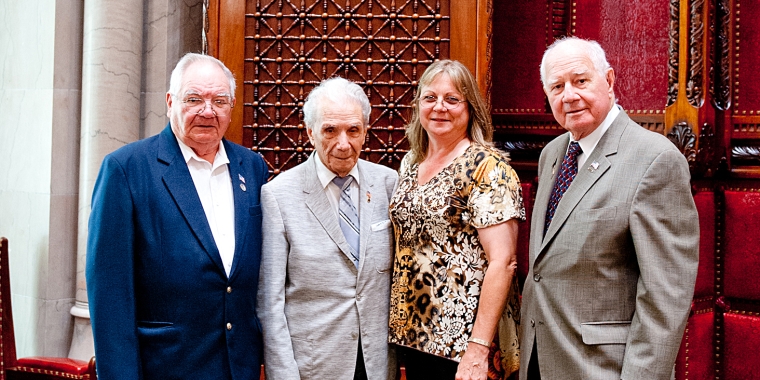
Larkin Highlights Senate Plan As Budget Deadline Nears
William J. Larkin Jr.
March 16, 2005
Senator Bill Larkin (R-C, Cornwall-on-Hudson) today announced highlights of the Senate’s proposals for the 2005-06 state budget.
As Chair of the Budget Conference Committee on Taxes & Economic Development, Senator Larkin said the Senate is proposing almost $1 billion in business tax reductions over the next four years to create jobs and strengthen the economy. In addition, the plan includes almost $1 billion in direct school property tax relief; tax credits for biotechnology; a small business health insurance tax credit; a direct school property tax relief rebate program; expansion of the Empire Zone program; and the adoption of a single sales factor to boost manufacturing jobs and investment in emerging technologies. The Senate tax cut plan would save $273.6 million in 2005-06, increasing to $2.3 billion in four years.
The Senate’s Education Aid plan provides for an increase of $626 million in aid to schools across New York State. It would add $425 million to the Governor’s proposed $201 million increase over last year. The Senate proposes setting aside $325 million in Sound Basic Education Aid proposed by the executive in a special reserve fund for education. In total, the plan would provide over $16 billion in aid to schools.
The plan also includes a previous Senate proposal to provide nearly $1 billion in direct school property tax relief to homeowners by protecting and enhancing the STAR property tax relief plan.
Under Higher Education, the Senate proposes $243 million in restorations, including a $117 million restoration for the Tuition Assistance Program (TAP), $103 million in restorations to the State University of New York (SUNY), $42 million to the City University of New York (CUNY) and funds for independent colleges and universities. The Senate also rejected proposals to raise CUNY ($250 per student) and SUNY ($500 per student) tuition. The plan also proposes a $250 million capital program for public and private colleges.
Highlights of the Senate’s Health Care plan include nearly $730 million in restorations to hospitals, nursing homes and health care that were proposed by the Executive. The Senate rejects new and higher taxes on hospitals and nursing homes,as well as cuts in payments for home health aides. The plan also includes measures aimed at stemming the growth of Medicaid, including a sweeping cap on Medicaid costs to local property taxpayers, increased local accountability, an aggressive crackdown on fraud, increased emphasis on managed care and limits on some services.
In the category of Transportation, the Senate proposes a $17.7 billion multi-year transportation capital plan, a $350 million investment in multi-modal transportation for facilities that provide more than one mode of transportation, and $100 million for local CHIPS highway assistance.
Under Local Government Assistance, the Senate proposes an increase over the Executive's Budget of $3.6 million. Under Environmental Protection, the Senate Budget includes $3 million for landfill closures, $5 million for municipal recycling, $5 million for secondary marketing, $1.3 million for natural resource damages in the Hudson River, $2 million for the pesticide database, $5 million for the Hudson River Estuary Plan and $17.7 for non-point source pollution. Within the Housing and Community Renewal budget, the Senate would restore $2.3 million for Rural Preservation Companies and $4.97 million for Neighborhood Preservation Companies. Under Agriculture, the Senate budget would restore $1 million for the Farm Viability Institute; $606,000 for Migrant Child Care; and $500,000 for the New York State Apple Growers Association. The Senate also provides $2.5 million for the Excell Farm Viability Program and $7 million for a new Excell-NY Agriculture Capital Program.The Senate budget provides $300,000 for the Cornell Community Integrated Pest Management program.
Share this Article or Press Release
Newsroom
Go to Newsroom